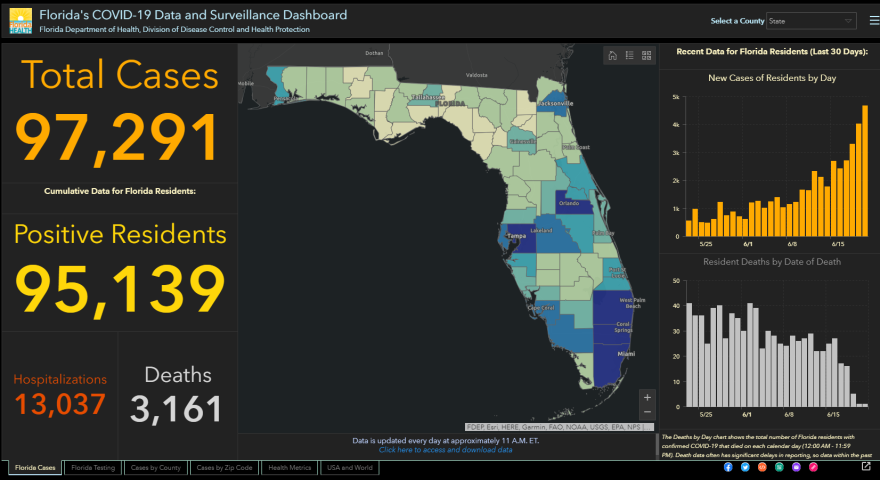Sunday marked the fourth consecutive day state health officials documented more than 3,000 new cases of the coronavirus in Florida in a single day.
The Florida Department of Health reported a new record high number of daily cases of COVID-19, Saturday, with 4,049 cases. On Sunday health officials reported another 3,494 new cases bringing the statewide total to 97,291 cases.
Since Friday, state health officials have reported 40 new coronavirus-related deaths increasing the statewide death toll to 3,144 fatalities.
The total number of COVID-19 hospitalizations in Florida has now risen to 12,939 patients.
Of the 1,562,280 tests that have been performed in Florida so far, 6.1 percent have been positive for the virus. Florida's positivity rate continues to trend upward.
Here in the Southwest Florida region including Charlotte, Collier, Glades, Hendry, Lee, Manatee and Sarasota Counties, state health officials have reported 1,125 new cases of the virus since Friday for a total of 11,117 cases. The Florida Department of Health reported 16 new deaths in Southwest Florida over the weekend including five new fatalities in Lee County, four in Manatee County, three new deaths in Collier County, two in Sarasota County and one new death each in Charlotte and Hendry Counties. The total Southwest Florida death toll now stands at 525 fatalities.
State Health officials reported, Saturday, that a 17-year-old boy in Pasco County died, marking the youngest person in the state to die of COVID-19.
On Saturday, Gov. Ron DeSantis said this latest surge in coronavirus cases in Florida is largely among young adults.
“Not huge clinical consequences, but in terms of spread and in terms of the some of the vulnerable populations eventually seeping in there, certainly a cause for concern,” said DeSantis. “But our cases are shifting in a radical direction younger.”
The median ages for most new cases of the virus in Florida is now in the 20s and 30s. The governor also backed off his earlier stance that more testing was the reason for the rise in statewide cases.
“We are seeing more cases in that age group, and it is not purely just a function of the fact that they are testing more, part of it is that, but you are seeing a higher positivity rate,” said DeSantis.
DeSantis said it’s a signal of rising community spread. He has asked the state surgeon general to issue an updated public health advisory, reminding people it’s important to maintain social distance.
Though a state dashboard shows some hospitals are nearing capacity, Gov. Ron DeSantis and health care executives from around Florida said Friday there are more than enough hospital beds to deal with a surge in COVID-19 cases.
Confusion over the over the dashboard, operated by Florida’s Agency for Healthcare Administration, caused reports about a lack of intensive care unit beds around the state as cases of the coronavirus rapidly multiply.
“Reports that somehow we are running out of hospital beds are incorrect, grossly exaggerated,” Miami-Dade Mayor Carlos Gimenez said during a roundtable discussion with DeSantis and hospital executives on Friday. “This is concerning, that the positive rate may be going up. That's why we're going to be cracking down on enforcement, but it's not alarming.”
DeSantis called the executives together to talk about hospital capacity in South Florida and across the state.
“We have twice as much capacity in the hospitals throughout the state of Florida today, then before the pandemic began,” DeSantis said.
The confusion occurred because the state’s dashboard does not provide the whole picture, officials said.
Hospitals provide the state with daily data about how many beds they are staffed to accommodate. And the dashboard does report a lack of beds at several hospitals around the state.
But hospitals frequently take unused beds offline, which will impact how their capacity is reported on the dashboard, according to a statement from AHCA.
And hospital officials said they have the ability to increase their beds and staff based on demand. The state dashboard does not reflect that capacity.
“Hospitals have the ability to convert beds and bring additional ICU beds online in a surge situation when necessary,” AHCA spokesman Patrick Manderfield said in a statement. “Within 48 hours, hospitals have the capability to dramatically increase statewide staffed capacity in the event of a surge situation.”
In the Tampa Bay area, spokespeople from major hospital groups including HCA, AdventHealth, Tampa General and BayCare told Health News Florida that the current surge in coronavirus cases is not putting them over capacity.
But the state’s dashboard showed that Hillsborough County hospitals only had 15% of their 418 intensive care unit beds available as of 5:30 p.m. Friday. In Pinellas County, the dashboard showed 59 of the county’s 328 beds were available.
But those numbers don't tell the whole story, Baycare spokeswoman Vjollca Hysenlika said in a statement.
“In almost all cases, hospitals’ maximum capacity is greater than any day’s staffed bed number and would be even greater still when the state allows hospitals to implement their approved surge response measures that can convert spaces for treating patients that are not normally used, such as a conference room,” Hysenlika said.
All of the hospital systems said they have emergency plans for a surge in COVID-19 cases that involve working with other health care systems in the area to accommodate overflow.
“All hospitals in the AdventHealth West Florida Division are closely and continuously monitoring positive COVID-19 cases in their facilities,” Mike Schultz, president and CEO of the west Florida division of AdventHealth said in a statement.
“We currently have sufficient personal protective equipment for our team members, patients and guests, as well as available patient beds, ICU beds and ventilators, should they be needed. At this time, we are not experiencing a surge in patients who require hospitalization due to COVID-19.”
Florida’s tourism-based economy saw its unemployment rate go up again last month, even as many businesses began reopening across the state.
Florida posted a 14.5 percent unemployment rate in May as businesses and workers continue to be hammered by the coronavirus pandemic.
The 14.5 percent mark was up from an adjusted rate of 13.8 percent in April, according to the Florida Department of Economic Opportunity. The May rate reflects 1.4 million jobless Floridians out of a labor force of 9.7 million people.
Despite the increase in the state’s unemployment rate, DEO chief economist Adrienne Johnston said there are signs the economy is starting to recover.
“There are likely people who are coming back into the workforce. They are encouraged to find jobs,” said Johnston.
“They may be counted as unemployed, but they are actively seeking work. They were not counted as that in the prior month.”
The state did see job gains in several fields, including construction, food service and health care.
Overall, the total number of private sector jobs in the state remains down by more than 834,000 from a year ago
Cruise lines that had planned on resuming passenger trips later this summer are now extending that delay further. The AP reports, the Cruise Lines International Association has announced ships will not be sailing from U.S. ports for at least a couple more months. The U.S. Centers for Disease Control and Prevention's current no-sail order is set to expire July 24.
The Association says cruise lines are voluntarily extending their suspension until September 15 in order to "resolve barriers" with U.S. authorities to restart sailing.
The Carnival Cruise Line announced in May that it planned to restart cruises from Florida and Texas in August, but that has since been extended until September 15.
Miami Dade County Mayor Carlos Gimenez is enforcing a new order that requires tougher enforcement of social distancing compliance by businesses. At a press conference, Friday, he said violations are a second-degree misdemeanor.
“Everyone should take this seriously. We can’t continue to open up the economy if people start acting like the virus is gone,” said Gimenez. “It’s not. Obviously, it’s still here and spreading.”
Business owners found in violation will need to sign an affidavit stating they’ve reviewed and understand the new guidelines.
Non-compliant business owners could also face a $500 fine and up to 180 days in jail.
The Golisano Foundation this morning, June 22, announced the award of $416,000 in COVID-19 Response Grants to organizations in Southwest Florida and in Western New York.
This third round of grant funding from the Golisano Foundation targets organizations serving people with intellectual and developmental disabilities with urgent needs amid the COVID-19 pandemic.
Here in Southwest Florida LARC (Lee Association for Remarkable Citizens, Inc.) was awarded a $39,000 grant. The STARability Foundation was awarded a grant of $45,000.
In a news release, Golisano Foundation executive director Ann Costello said this latest round of grant applications signals a shift from emergency preparedness to planning for reopening programs and services.
So far, the foundation has awarded more than $1.1 million in COVID-19 response grants.









